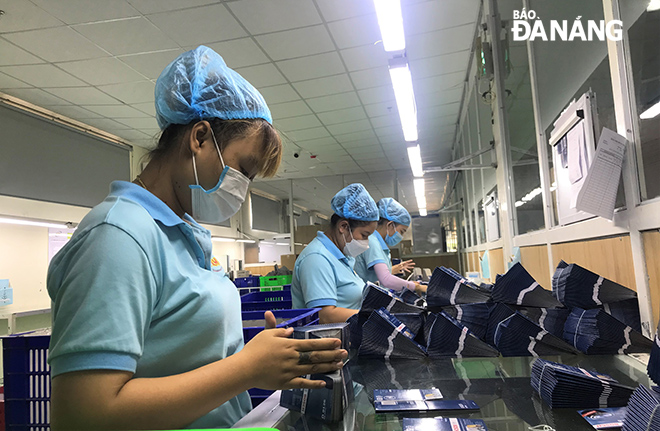Ups and downs in foreign currencies affect importers and exporters in Da Nang
The recent ups and downs in foreign currencies have affected importers and exporters in Da Nang in different ways. Particularly, the depreciation of the Euro has reduced the purchasing power, whilst the increase of the dollar has been favourable for exporters, but only in the short term.
 |
| Picture is taken at the Trung Khoa Company Limited based in the Da Nang Industrial Park in Son Tra District. |
More opportunities for exporters
Most importers and exporters in the city conduct trades and payments in the U.S. dollar, so the recent currency changes have brought short-term benefits to exporters.
Mr. Le Hoang Khanh Nhut, General Director of the Da Nang Rubber JSC (DRC) said that the company's export contracts are all paid in the U.S. dollar, so the appreciation of this currency will be beneficial to his company. The main reason is that the company has actively imported raw materials from the beginning of the year when the dollar has yet to rise but recently the currency has increased by about 3%, which is a positive signal.
For instance, at the beginning of this year, when the exchange rate for the U.S. dollar was set at VND22,600 per USD, so an exporter of USD1 million would have VND22.6 billion. However, with the exchange rate at VND23,300 per USD, the company would earn VND23.3 billion, an increase of VND700 million. Thus, the company will have more revenue to increase production investment and solve the problem of rising input material prices, thereby reducing cost pressure.
Meanwhile, Mr. Bui Minh Vu, Head of the Import-Export Office of the Foster Da Nang Electronics Co., Ltd., said that the rise of the dollar does not affect his company a lot because the company’s raw material imports and finished product exports in the Chinese market have done in the dollar.
“If the enterprise benefits, it will only be in the short term when the imported materials are still in stock, but when the raw materials are imported at the new exchange rate, almost nothing will change” added he.
Director of the Forestry Products Export JSC Huynh Trinh informed that the company's export market is Europe, but most of the company’s trades and payments are made using the U.S. dollar. The company's production materials come from domestic markets, so an increase in the USD is generally beneficial, but the decrease in the Euro leads to a decline in the purchasing power of its partners.
“Despite the increase in dollar, it was at the low point of the wood industry, so the revenue of the company did not increase much. In addition, inflation in the world has increased again, people are only focusing on essential products, so consumption demand will decrease, if it continues for a long time, when in the peak season, businesses will encounter problems. difficult because the number of orders is less. In the fourth quarter, his company may face difficulties due to new fluctuations, including exchange rate issues" said Trinh.
Importers encounter difficulties
Contrary to exporters, importers are encountering difficulties, especially those which import finished products from abroad and sell them in Viet Nam, because they have to convert from VND to USD for payments.
Mrs. Dinh Thi Thuy Phuong, Head of the Import-Export Department of the Bac Trung Nam Seafood JSC, said that in addition to freight rates, the USD exchange rate is still a big concern for businesses.
She remarked the dollar's strong recent appreciation since late June has resulted in an increase of about 2% in the prices of the company's imported products, excluding the spike in shipping costs and other costs.
According to the analysis made by Mr To Van Hiep, the Chairman of the Da Nang Trucking Association cum Director of the Green Lien Chieu Logistics JSC, the movements of foreign currencies over the past time have had different impacts on importers and exporters, as well as indirectly affected the logistics businesses which have import-export partners. Because importers have to recalculate market demand and import goods in moderation when the dollar increases.
Besides, although it is beneficial for exporters to pay in USD, the number of orders has not increased, even some industries in the low production season. In parallel, the decline of the Euro makes Vietnamese goods exported to Europe become more expensive and more difficult to compete with those from other countries in this market.
Therefore, Mr. Hiep suggested that importers should diversify the supplies of domestic raw materials in order to be proactive in delivery time and save transportation costs, especially construction material importers.
Reporting by M.QUE - Translating by M.DUNG